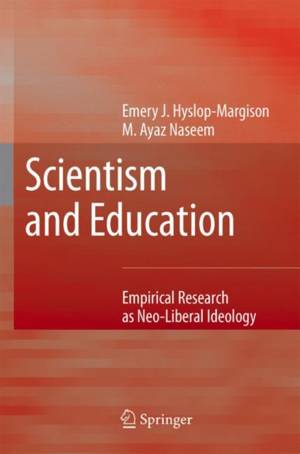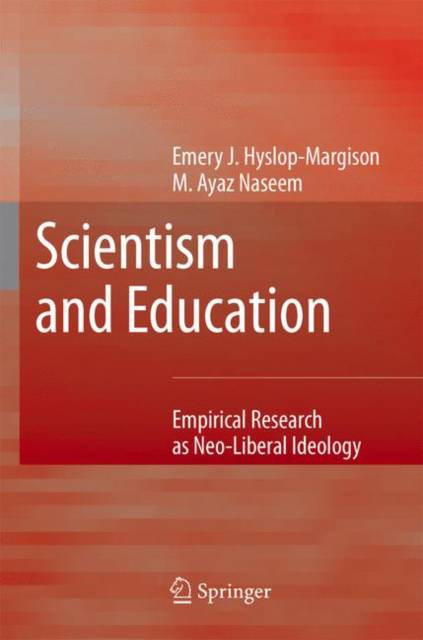
Bedankt voor het vertrouwen het afgelopen jaar! Om jou te bedanken bieden we GRATIS verzending (in België) aan op alles gedurende de hele maand januari.
- Afhalen na 1 uur in een winkel met voorraad
- In januari gratis thuislevering in België
- Ruim aanbod met 7 miljoen producten
Bedankt voor het vertrouwen het afgelopen jaar! Om jou te bedanken bieden we GRATIS verzending (in België) aan op alles gedurende de hele maand januari.
- Afhalen na 1 uur in een winkel met voorraad
- In januari gratis thuislevering in België
- Ruim aanbod met 7 miljoen producten
Zoeken
Scientism and Education
Empirical Research as Neo-Liberal Ideology
Emery J Hyslop-Margison, Ayaz Naseem
Hardcover | Engels
€ 165,95
+ 331 punten
Uitvoering
Omschrijving
We presently live in an era dominated by scientism, an ideology that believes that science (and its rationalist foundation in modern epistemology) has an undeniable primacy over all other ways of seeing and understanding life and the world, including more humanistic, mythical, spiritual, and artistic interpretations. In being critical of scientism as I am, I am not against science per se: modern science and its ways of understanding and knowing the world are valuable, and we should be grateful for them. But it is the hegemony of the habits of mind that manifest pervasively in education that privilege science education, career, and research over other modes and branches of learning and knowing that I have problems with. I have too often witnessed parents overtly or subtly discouraging their children from following artistic or humanistic aspirations and pushing them for training and careers in Science, Math, Business, and Technology. In this society we say in a thousand and one ways that money, security, power, and ultimately fulfillment reside in these disciplines and not in the Arts, Humanities, and Philosophy. We valorize scientists, and even when they speak on subjects outside their domain of expertise, we take their opinions and pronouncements as definitively authoritative. When Science speaks, people listen. This hegemonic attitude towards Science and other subjects that require the exercise of our rational and intellectual faculty is reflected in educational research as well.
Specificaties
Betrokkenen
- Auteur(s):
- Uitgeverij:
Inhoud
- Aantal bladzijden:
- 134
- Taal:
- Engels
Eigenschappen
- Productcode (EAN):
- 9781402066771
- Verschijningsdatum:
- 29/10/2007
- Uitvoering:
- Hardcover
- Formaat:
- Genaaid
- Afmetingen:
- 156 mm x 234 mm
- Gewicht:
- 399 g

Alleen bij Standaard Boekhandel
+ 331 punten op je klantenkaart van Standaard Boekhandel
Beoordelingen
We publiceren alleen reviews die voldoen aan de voorwaarden voor reviews. Bekijk onze voorwaarden voor reviews.









